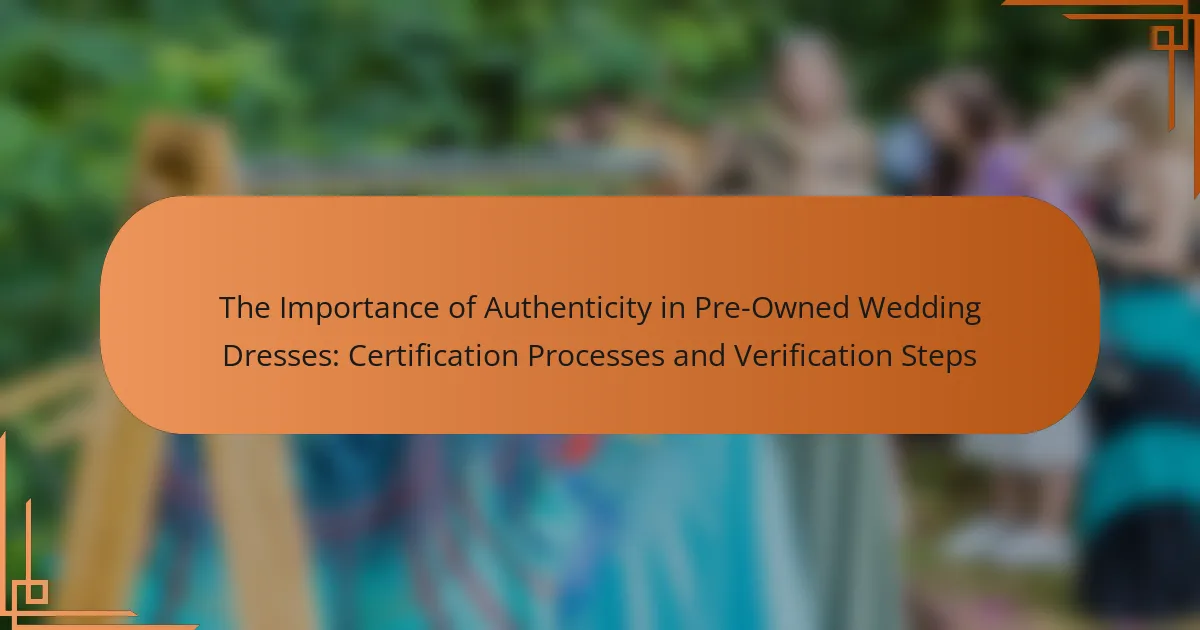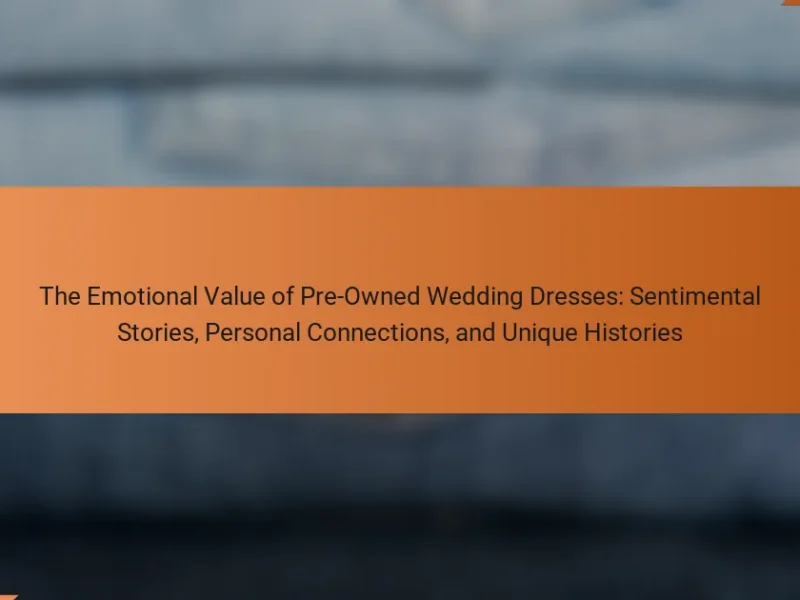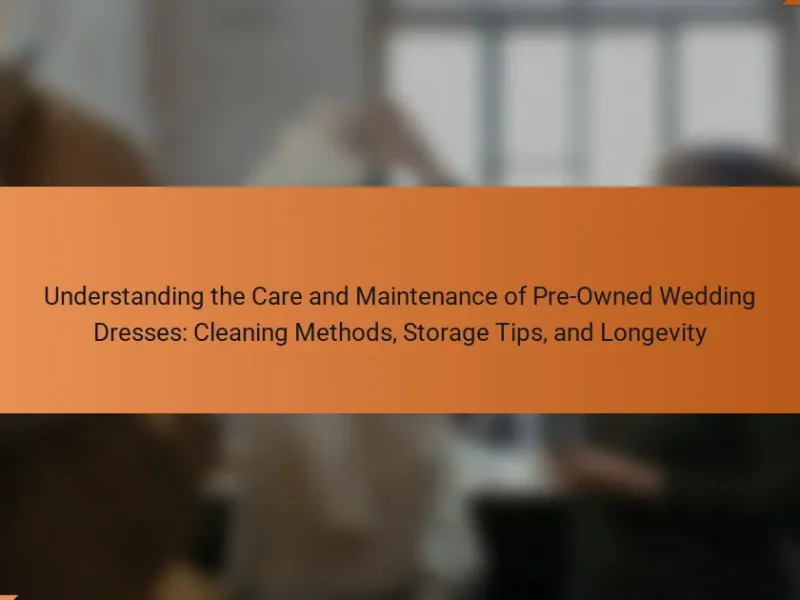Authenticity in pre-owned wedding dresses is essential for ensuring trust and value, as it confirms that the dress originates from a reputable designer or brand. Authentic dresses not only retain higher resale value but also enhance buyer confidence through verification processes such as certification. Key steps for buyers to verify authenticity include requesting detailed photographs, inquiring about the dress’s history, checking for designer labels, obtaining professional appraisals, and requesting documentation from previous purchases. Certification and verification enhance buyer security by providing documented proof of a dress’s quality and authenticity, ultimately leading to informed purchasing decisions and higher customer satisfaction.
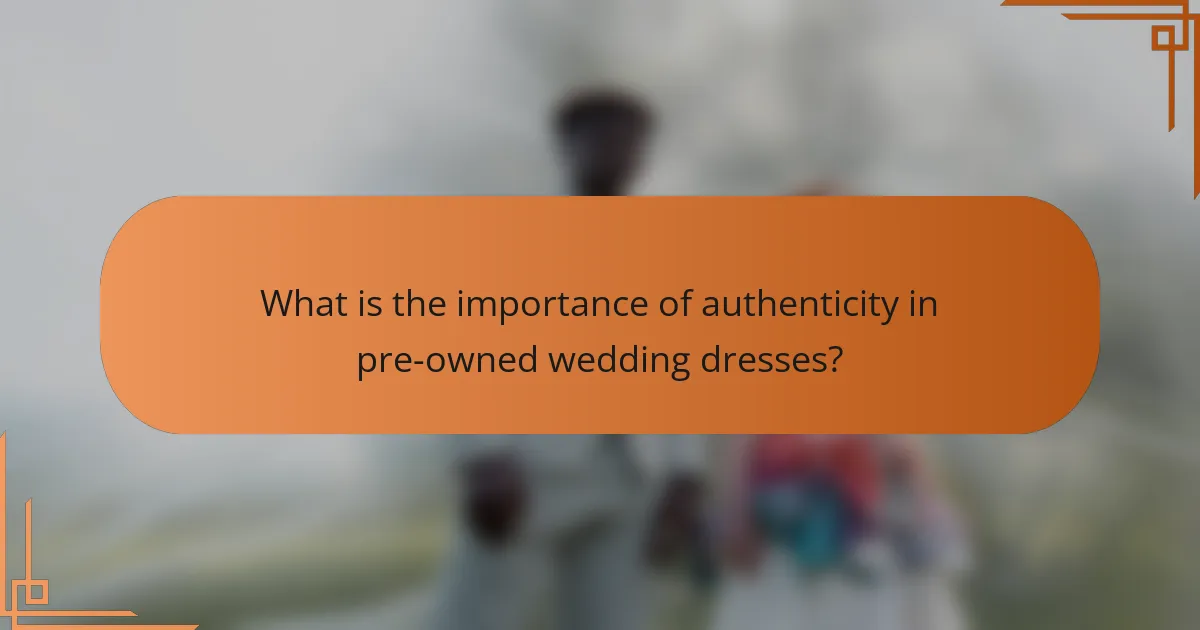
What is the importance of authenticity in pre-owned wedding dresses?
Authenticity in pre-owned wedding dresses is crucial for ensuring trust and value. It guarantees that the dress is genuinely from a reputable designer or brand. Authentic dresses often retain higher resale value compared to replicas. Buyers seek assurance that they are investing in a quality product. Verification processes, such as certification, help confirm the dress’s origin and authenticity. This reduces the risk of fraud and enhances buyer confidence. Additionally, authentic dresses often come with original tags or certificates, further establishing their legitimacy. Overall, authenticity is vital for maintaining the integrity of the pre-owned wedding dress market.
Why is authenticity crucial for pre-owned wedding dresses?
Authenticity is crucial for pre-owned wedding dresses because it ensures the integrity and value of the garment. Verified authenticity confirms that the dress is genuine and not a replica. This verification protects buyers from scams and counterfeit products. Authentic dresses often retain higher resale value, making them a worthwhile investment. Furthermore, authenticity can provide buyers with a sense of connection to the original owner’s story. Dresses with documented authenticity may also come with certificates from reputable sources. This documentation can enhance the dress’s appeal and trustworthiness. Overall, authenticity is essential for maintaining quality and trust in the pre-owned wedding dress market.
What risks are associated with purchasing non-authentic wedding dresses?
Purchasing non-authentic wedding dresses poses several risks. These dresses may be of inferior quality, leading to potential damage during wear. Non-authentic dresses often lack proper craftsmanship, resulting in poor fit and discomfort. They may not adhere to safety standards, posing risks such as flammability. Additionally, purchasing non-authentic dresses can lead to financial loss if the dress does not meet expectations. Reselling non-authentic dresses can also be challenging due to their lack of value. Buyers may face legal issues if the dress infringes on trademarked designs. Lastly, the emotional impact of wearing a non-authentic dress can diminish the significance of the wedding day.
How does authenticity impact the value of pre-owned wedding dresses?
Authenticity significantly enhances the value of pre-owned wedding dresses. Verified authentic dresses often command higher prices in the resale market. Buyers are willing to pay more for dresses with confirmed provenance. This is because authenticity assures quality and designer reputation. A well-documented history increases buyer confidence. Additionally, dresses with authenticity certificates can retain value over time. Studies have shown that authenticated items often appreciate in value. For example, a report from The RealReal indicates authenticated luxury items sell for 20% more than non-authenticated ones. Thus, authenticity is a crucial factor in determining the resale value of pre-owned wedding dresses.
What are the certification processes for verifying authenticity?
Certification processes for verifying authenticity involve several key steps. First, an expert appraiser examines the item for unique identifiers. These identifiers may include labels, tags, or specific design features. Next, documentation is reviewed to confirm the item’s history and previous ownership. Certificates of authenticity may be issued by reputable organizations to verify legitimacy. Third-party authentication services can also be utilized for additional verification. These services often provide detailed reports on the item’s authenticity. Finally, maintaining clear records throughout the process is essential for future reference. This structured approach ensures that the authenticity of pre-owned wedding dresses is thoroughly verified.
What organizations provide certification for pre-owned wedding dresses?
Organizations that provide certification for pre-owned wedding dresses include the Association of Wedding Gown Specialists and the International Society of Wedding Planners. The Association of Wedding Gown Specialists offers a certification program that ensures proper cleaning and preservation of wedding dresses. This organization has a network of certified specialists who adhere to specific standards. The International Society of Wedding Planners also endorses vendors who meet quality assurance guidelines for pre-owned dresses. These organizations help maintain authenticity and quality in the resale market.
How is the certification process conducted?
The certification process for pre-owned wedding dresses is conducted through a series of verification steps. First, the dress is examined for authenticity by certified professionals. These experts assess the brand, materials, and craftsmanship. Next, documentation is collected to support the dress’s history and provenance. This may include original receipts or certificates of authenticity. After verification, the dress is assigned a unique certification number. This number links to a database that tracks the dress’s authenticity. Finally, the certified dress is tagged with information about its condition and authenticity. This thorough process ensures buyers can trust the quality and origin of the pre-owned wedding dress.
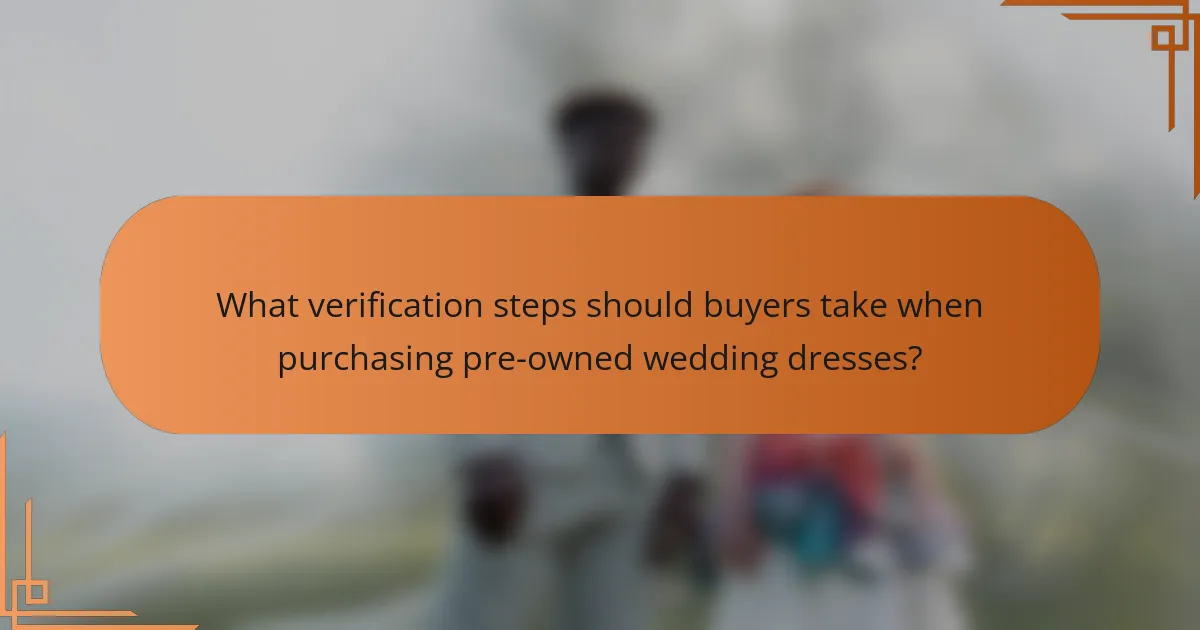
What verification steps should buyers take when purchasing pre-owned wedding dresses?
Buyers should verify the authenticity and condition of pre-owned wedding dresses through several key steps. First, they should request detailed photographs of the dress from multiple angles. This helps assess the dress’s condition and any potential damages. Second, buyers should inquire about the dress’s history, including previous ownership and any alterations made. Knowing the dress’s background adds to its authenticity. Third, buyers should check for labels and tags that indicate the designer or brand. Authentic labels can confirm the dress’s origin. Fourth, they should consider obtaining a professional appraisal or inspection. Experts can provide insights into the dress’s value and condition. Lastly, buyers should ask for receipts or documentation from previous purchases. This proof can validate the dress’s authenticity and ownership history.
How can buyers identify authentic pre-owned wedding dresses?
Buyers can identify authentic pre-owned wedding dresses by checking for labels and tags. Authentic dresses usually have designer tags with specific branding details. Buyers should also look for the original purchase receipt or proof of authenticity. Examining the dress’s craftsmanship is crucial; high-quality stitching and materials indicate authenticity. Buyers can request a professional appraisal for verification. Researching the designer’s specific features helps in identifying genuine pieces. Additionally, reputable sellers often provide a certificate of authenticity. These steps can help ensure the buyer receives a genuine pre-owned wedding dress.
What specific labels or tags indicate authenticity?
Specific labels that indicate authenticity include “Certified Pre-Owned,” “Authentic Brand Guarantee,” and “Verified Resale.” These labels ensure that the item has undergone a thorough verification process. “Certified Pre-Owned” signifies that the dress has been inspected and meets specific quality standards. “Authentic Brand Guarantee” is often issued by the original manufacturer or authorized retailers. “Verified Resale” indicates that a third-party service has authenticated the dress. These tags help consumers trust the purchase of pre-owned wedding dresses.
How can buyers assess the condition of a pre-owned wedding dress?
Buyers can assess the condition of a pre-owned wedding dress by examining several key factors. First, inspect the fabric for any stains, tears, or discoloration. Check for loose seams or missing beads. Look for signs of wear, such as pilling or fraying. Verify the dress’s structure by ensuring it retains its original shape. Additionally, consider the age of the dress, as older dresses may show more wear. Request detailed photographs from the seller to evaluate the dress remotely. Finally, ask for a professional cleaning history to understand its maintenance. These steps help ensure that buyers make informed decisions about their purchase.
What documentation is necessary for verifying authenticity?
Documentation necessary for verifying authenticity includes certificates of authenticity, purchase receipts, and appraisals. Certificates of authenticity provide a formal declaration from a recognized authority. Purchase receipts serve as proof of the original transaction and ownership. Appraisals offer an expert evaluation of the dress’s value and condition. These documents help establish the provenance and legitimacy of pre-owned wedding dresses. Their presence can significantly enhance buyer confidence.
What role do receipts and previous ownership documents play?
Receipts and previous ownership documents serve as critical proof of authenticity for pre-owned wedding dresses. They verify the dress’s history and confirm its previous ownership. Receipts provide details such as purchase date, price, and retailer information. Previous ownership documents can include certificates of authenticity or appraisals. These documents help potential buyers assess the dress’s value and legitimacy. Authenticity is essential in the wedding dress market to prevent fraud. Therefore, having these documents increases buyer confidence and supports resale value.
What should buyers look for in authenticity certificates?
Buyers should look for specific features in authenticity certificates to ensure legitimacy. Key elements include the certificate’s issuer, which should be a reputable organization. Buyers should also verify the certificate’s unique identification number linked to the item. The description of the item should match the dress being purchased. Additionally, the certificate should include details about the item’s provenance and previous ownership. A signature or seal from the issuer adds credibility. Buyers should also check for any expiration dates or conditions related to the certificate’s validity. These factors contribute to the overall assurance of authenticity in pre-owned wedding dresses.
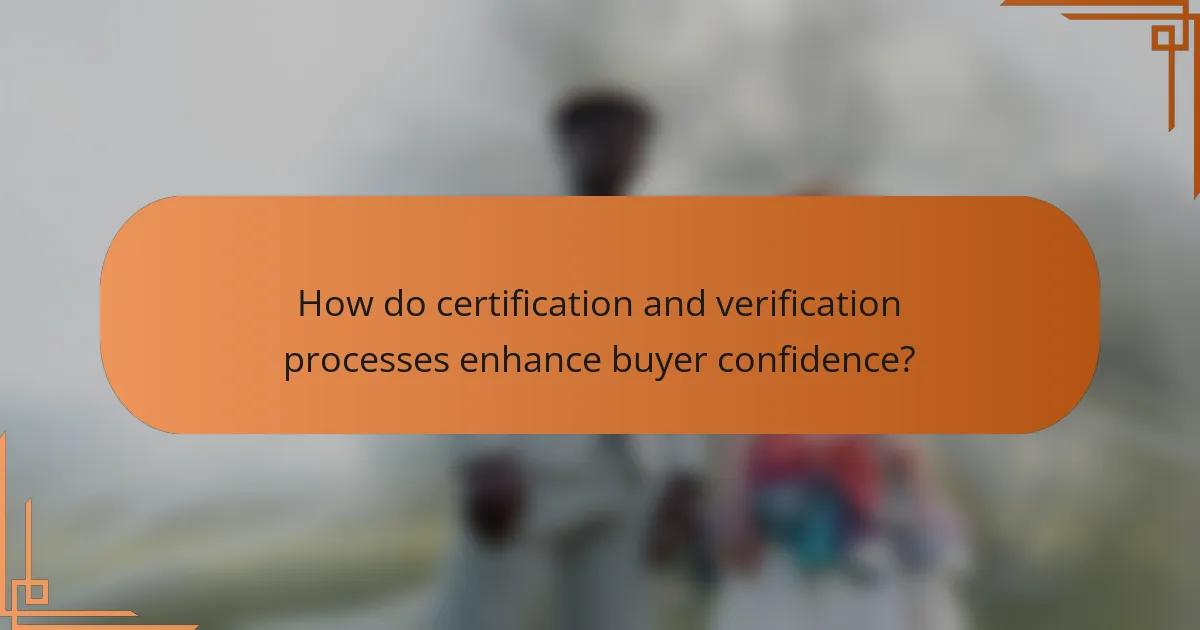
How do certification and verification processes enhance buyer confidence?
Certification and verification processes enhance buyer confidence by ensuring the authenticity and quality of products. These processes provide documented proof that a pre-owned wedding dress meets specific standards. Buyers feel more secure knowing that the dress has been evaluated by a trusted authority. Certification often includes details about the dress’s condition, materials, and provenance. This transparency helps buyers make informed decisions. Research shows that 85% of consumers are more likely to purchase when they see certification marks. Furthermore, verified products typically have lower return rates, indicating higher satisfaction among buyers.
What are the benefits of purchasing certified pre-owned wedding dresses?
Purchasing certified pre-owned wedding dresses offers several benefits. First, these dresses are often more affordable than new ones. Studies show that certified pre-owned dresses can cost 30% to 70% less than retail prices. Second, certified dresses ensure authenticity and quality. Certification processes verify the dress’s condition and designer, providing peace of mind to buyers. Third, buying pre-owned supports sustainability. It reduces waste and promotes eco-friendly practices in the fashion industry. Lastly, certified pre-owned dresses may feature unique styles. Many brides appreciate the opportunity to wear a one-of-a-kind gown that may no longer be in production.
How does certification affect resale value?
Certification significantly enhances the resale value of pre-owned wedding dresses. Certified dresses assure buyers of authenticity and quality. This assurance leads to increased buyer confidence. Higher buyer confidence often translates to higher selling prices. A study by the National Association of Resale Professionals indicates that certified items can sell for 20% to 30% more than non-certified counterparts. Additionally, certification can reduce time on the market. Dresses with certification often attract more interested buyers. Overall, certification positively impacts resale value by establishing trust and perceived value.
Why do buyers prefer certified pre-owned wedding dresses over non-certified options?
Buyers prefer certified pre-owned wedding dresses because certification ensures quality and authenticity. Certified dresses undergo thorough inspections to confirm their condition and origin. This process provides buyers with confidence in their purchase. Non-certified options may lack such guarantees, leading to uncertainty. Research shows that 78% of buyers prioritize authenticity when selecting wedding attire. Certified dresses often come with documented proof of their history and condition. This transparency fosters trust between sellers and buyers. Ultimately, certification enhances the overall shopping experience for brides.
What common pitfalls should buyers avoid when verifying authenticity?
Buyers should avoid several common pitfalls when verifying authenticity. One major pitfall is relying solely on online images. Images can be manipulated or misrepresented. Buyers should request detailed photos and documentation. Another pitfall is not researching the seller’s reputation. Buyers should check reviews and ratings. Failing to ask for a certificate of authenticity is also common. Authentic items often come with such documentation. Buyers should be cautious of deals that seem too good to be true. Significant discounts may indicate inauthentic items. Lastly, buyers often overlook the importance of expert opinions. Consulting with professionals can provide additional validation.
What red flags should buyers watch for in pre-owned wedding dress listings?
Buyers should watch for several red flags in pre-owned wedding dress listings. Inconsistent sizing information can indicate a lack of transparency. Poor quality images may hide flaws in the dress. Sellers who do not provide detailed descriptions raise concerns about authenticity. Dresses with unclear provenance may not be genuine designer items. Unusually low prices can suggest counterfeit or damaged products. Lack of return policy can indicate buyer risk. Reviews or ratings for the seller should be checked for credibility. These factors help ensure a satisfactory purchase experience.
How can buyers ensure they are not misled by counterfeit certifications?
Buyers can ensure they are not misled by counterfeit certifications by verifying the authenticity of the certification itself. They should request documentation from the seller that proves the dress is certified. Buyers should also check for recognizable certification bodies known for their rigorous standards. Researching the certification body’s reputation can provide insights into its legitimacy. Additionally, buyers can cross-reference the certification with the official database or website of the certifying organization. Engaging with previous customers or seeking reviews can also offer assurance of the seller’s credibility. Finally, buyers should be cautious of prices that seem too good to be true, as they may indicate counterfeit certifications.
What best practices should buyers follow when purchasing pre-owned wedding dresses?
Buyers should thoroughly inspect pre-owned wedding dresses before purchasing. Check for stains, tears, and overall condition. Request detailed photographs from the seller. Verify the dress’s authenticity through tags or certificates. Ask about previous alterations and the dress’s history. Consider professional cleaning before the first wear. Research reputable sellers with positive reviews. Ensure a clear return policy is in place. These practices help ensure a satisfying purchase experience.
How can buyers conduct thorough research on sellers?
Buyers can conduct thorough research on sellers by verifying their credentials and reading customer reviews. Checking for certifications related to authenticity is essential. Buyers should also examine the seller’s return policy and warranty options. Investigating the seller’s online presence can provide insights into their reputation. Social media platforms often showcase customer feedback and seller transparency. Additionally, buyers can ask for references from previous customers. Engaging in direct communication with the seller can clarify any doubts. Finally, researching industry standards can help buyers gauge seller reliability.
What questions should buyers ask to ensure authenticity before purchasing?
Buyers should ask specific questions to ensure authenticity before purchasing pre-owned wedding dresses. Key questions include: “Can you provide proof of purchase or original receipts?” This verifies the dress’s origin. “Is there a certificate of authenticity available?” This confirms the dress’s legitimacy. “What brand and model is the dress?” Knowing the specific details aids in verification. “Have there been any alterations?” Understanding modifications helps assess authenticity. “Can I see detailed photos of the dress?” High-quality images reveal condition and authenticity. “Where was the dress purchased?” Knowing the retailer can provide additional context. “What is the return policy?” A clear policy indicates seller confidence in authenticity. These questions help buyers make informed decisions.
The main entity of this article is pre-owned wedding dresses, with a focus on the importance of authenticity in their purchase. The article outlines how authenticity ensures trust and value, detailing the risks associated with non-authentic dresses and the impact of authenticity on resale value. It describes certification processes for verifying authenticity, the role of reputable organizations, and the necessary documentation for buyers. Additionally, it highlights best practices for buyers to avoid pitfalls and ensure they are purchasing genuine products, ultimately enhancing buyer confidence in the pre-owned wedding dress market.
